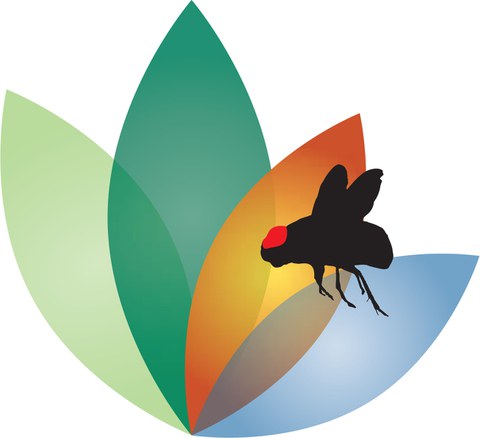Jan 31, 2018
Tracking down pest control strategies: Project to investigate the temperature behaviour of the fruit fly "Drosophila" receives research funding of more than 2 million euro

Key Visual for the project - Investigation of the seasonal temperature behaviour of the fruit fly "Drosophila"
The German Research Foundation (DFG) has approved the research project "Seasonal temperature acclimation in Drosophila: A multidisciplinary approach" with a funding volume of 2 million euro. The interdisciplinary research team with scientists from seven different research institutions throughout Germany began its work in January 2018.
Up to now, the basic principles through which insects acclimate to temperature fluctuations in the environment have been poorly understood. The interdisciplinary research team led by Suzanne Eaton (Spokeswoman of the research group, TU Dresden, BIOTEC), Marko Brankatschk (TU Dresden, BIOTEC), Susanne Voigt (TU Dresden, Biology), Thomas Wöhner (Julius Kühn Institute Dresden), Ünal Coskun (PLID/Helmholtz Center), Andrei Shevchenko (MPI-CBG), Martin Kaltenpoth (University of Mainz) and John Parsch (LMU Munich) is thus filling a research gap. Preliminary research shows that food components can significantly change the metabolism and cellular composition of fruit flies under laboratory conditions. In the right combination, food can thus help these animals to achieve considerable temperature resistance. Therefore, the research group will study the seasonal feeding behaviour of wild fruit and cherry vinegar flies in Saxony and compare the results with their laboratory data. Should theory and practice converge in this project, the results would be of immense importance. It would improve our basic understanding of biological phenomena, such as the survival of a complex organism during and after temporary freezing. This project would also identify new pest control strategies that could reduce the use of insecticides as much as possible. Considering the continuing bee mortality, this aspect should be particularly emphasised," explains Marko Brankatschk.
The idea for the newly founded research association has been funded by TU Dresden since 2016 and coordinated by BIOTEC. The university uses the interdisciplinary approach of the project and the networking of different research institutes to further strengthen its strategic goal of integrating the theoretical and practical research landscape in Saxony more closely, and highlighting it in international competition.
Media inquiries:
Professor Dr. Suzanne Eaton
Spokesperson of the Research Unit 2682
BIOTEC (TU Dresden)
Dr. Marko Brankatschk
BIOTEC (TU Dresden)
Franziska Clauß, M.A. (Press Officer)
Tel.: +49 (0) 351 458-82065
The Biotechnology Center was founded in 2000 as a central scientific unit of the TU Dresden with the goal of combining modern approaches in molecular and cell biology with the traditionally strong engineering in Dresden. Since 2016 the BIOTEC is part of the central scientific unit “Center for Molecular and Cellular Bioengineering” (CMCB) of the TU Dresden. The BIOTEC plays a central role in the “Molecular Bioengineering and Regenerative Medicine” profile of the TU Dresden, fostering developments in the new field of Biotechnology/Biomedicine. The center focuses on cell biology, nanobiotechnology, and bioinformatics. www.tu-dresden.de/biotec
